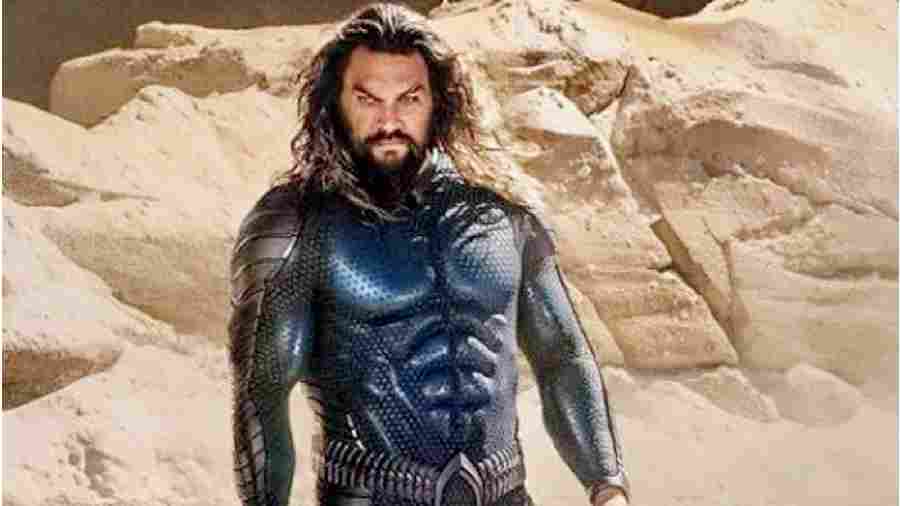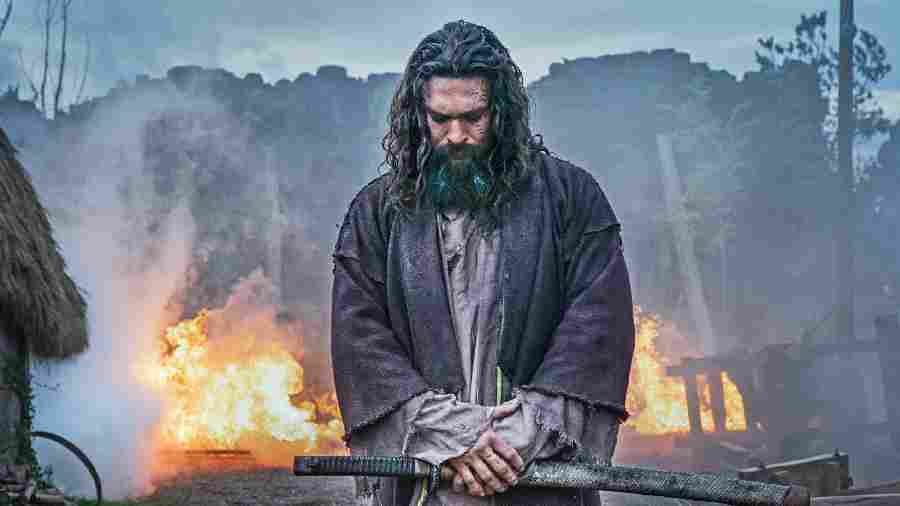One of the most challenging shows on TV is winding up and even its protagonist feels it took a lot out of him. When Apple TV+ launched See in November 2019, it was considered a lavish production with Jason Momoa at the heart of it. But then critics went deeper into the character of Baba Voss, a fearless warrior and the leader of the Alkenny Tribe.
Set in the future, a virus has wiped out most of humanity and the descendants of the couple of million who survive lose their vision. It’s a new world order where survival depends on how people use their other senses. The final season opens a year after Baba Voss has defeated his nemesis brother Edo but soon is woken out of his slumber as new weaponry threatens the future of humanity. Baba returns. And The Telegraph found out from Momoa (during an interview with a few select journalists from across the globe) why Baba will remain his favourite character.
You’re no stranger to working in the realm of sci-fi and fantasy, but what is it about this unique world of See that sets the series apart from other properties you’ve been involved in?
If you just break it down to what it’s like for action, I can’t make eye contact when I’m swinging a sword at someone. So it’s very challenging to fight, and not look at someone knowing you can see and you don’t want to hurt your stuntmen, who are actors. It’s exciting because you are constantly challenged. And as far as my career goes, this is the most challenging thing I’ve ever done. And definitely the biggest emotional roller-coaster journey.
In the final season of See, do we see some closure to all the beloved characters in the story?
In this last season, we will show what humanity and humans can do. What we’re going to see this season are bombs and destruction, and see a lot of war and chaos. And I feel like it’s Baba still trying to keep his family together. Baba has to take on a lot of crazy new obstacles. He’s trying to keep his beautiful family together and there are a lot of surprises. What would a father do for his family? And how far would you go?
Do you consider Baba Voss and this series to be the most fulfilling moment in your career so far?
Yeah, this is definitely the highlight of my career. I’ve worked on things that made me go, ‘Wow, it is amazing to be a part of this franchise’, like to be a part of Dune as Duncan Idaho; it was unbelievable. But the emotional roller coaster I’ve been on for the last three seasons of See makes it my best work till date. It’s the hardest thing. There has been a lot of growth in my life. The depths of what I learned as an actor… just studying with Joe (Strechay; consultant to help guide the authenticity of the blind world portrayed in the series) and training to act the role of a visually impaired person has made me respect what I do. This is the most weight I’ve had on me for any character. And I’m happy that it has been well accepted and it’s definitely the funnest thing I’ve ever played.

Jason Momoa as Aquaman
What were the challenges of playing a visually impaired man who can sort of do everything and more than a person with sight, especially in those action scenes?
The truth is the more we trained to not use vision, the better we became. And you’re not using your vision… making me become like this ultimate warrior. We normally see with our eyes, but to hunt one has to become like this animal who has to use all its senses… to like ‘use’ the hair on the arms. I feel when we did all the different sounds (practised with different sounds), that style actually gave me a deeper appreciation for all the senses, which in turn goes into the making of this ultimate warrior. I love the act of appreciating every feeling and being able to touch someone’s body instead of just being able to shoot a gun. He’s right there. It’s like fighting in close quarters, to be able to smell… it’s extremely interesting. And it’s made me sharper to hunt and be able to perform better when you can’t see the enemy.
The series received the Ruderman Seal of Approval for Authentic Representation (awarded to television or feature film projects featuring actors with disabilities in substantial speaking roles) in 2020 for its depiction of people with visual impairments. As the lead of this series did you think at the beginning that it could change minds and move the needle like it has?
Without sounding arrogant? Yes. Because of the work that Joe has put in, the work the teams have put in. In the first season, I’d never prepared for a character this much. And then with all the characters on the show learning together, learning these styles… it was teamwork. So yes, Apple cared enough, and I feel like we cared enough.
How did you prepare yourself for the action scenes in season three?
I got hurt. We shot season two and three back-to-back. And I tore my shoulder out and ended up getting a hernia. So I was pretty broken. So season three is me at probably my worst and broken... and I haven’t been home in a very long time. It was when Covid was happening and we were in Toronto, so I kind of felt like… I was living and hurting as much as he (Baba) was and have since then healed. But it was very, very challenging. There was training, which wasn’t really training; it was more like surviving and recovering and making sure that I could finish because I had to go do Aquaman the moment I wrapped up season three. So we shot season two, had the weekend off, and then went and shot season three. I’d been working non-stop and so it was about just trying to stay as healthy as possible. And I condition my body so we can be flexible and not get hurt. We did rehearse a lot but also had to cater to a lot of injuries. I watched the season finale last night and it didn’t look like I was hurt!
Did the experience of doing this show change you?
It has made me want to do great work. I don’t think I’ll ever top this character because of what the warrior character demands. The look and style of everything… I put everything into it; I have put in my all and there’s nothing left inside. I am very proud of the show. I had to do this looping thing for the end of the season. It’s like this massive four-minute piece. And when you’re acting it, it takes five days to shoot the whole thing. So you emotionally go through it over five days, when you have to loop it. It’s four minutes and 12 seconds long. And I had to go through that whole thing again and again. And I was so angry and I told our producer: ‘How am I supposed to go back into this (again)?’ And we were shooting fast. I was in Rome and it was cold. I went outside and it’s funny that I called Julian Schnabel, one of my all-time idols. We met and bonded over See. Once outside, I call him and I call my mother… so frustrated because I had to emotionally go through this roller coaster again. Then I had to say bye to Baba. I gave it my all. It’s a wonderful ending to the show.
In See, Earth is swept by a virus not dissimilar from something we’ve went through. And we’re kind of living our own science fiction drama. It turns out our own science fiction future is becoming more like See. What is your take on that? Where you think our future is headed?
I’m an actor. So I don’t think about the future in that (sci-fi) way. But then, it’s very scary to think about the virus and like what we went through with Covid. We’re so fragile and so lucky to be here. We are living in a sci-fi movie for sure. And just when you see everything coming out about space and seeing telescopes bringing back all those galaxies, I’m like, ‘Wow’. What’s gonna happen in the future? Pretty spooky.











